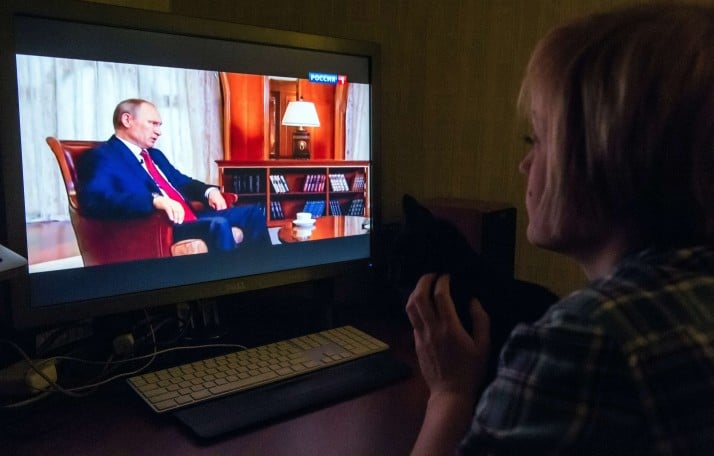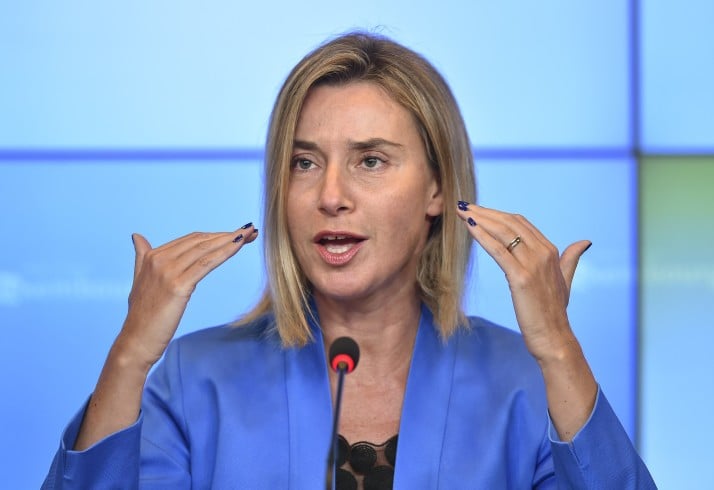
A woman looks at Russian President Vladimir Putin speaking as she watches an internet broadcast of the documentary “Homeward Bound”, on March 15, 2015 in Moscow. Putin said he was ready to put the country’s nuclear forces on alert as he sought to annex Crimea last year after the fall of a Moscow-backed government in Kiev. Speaking in a documentary aired on state TV in Russia on March 15, 2015, a year after the takeover of the Black Sea Peninsula from Ukraine, Putin showed the lengths he was willing to go to in order to protect Russian-speaking citizens of the province he considered a historic slice of Russia. AFP PHOTO / DMITRY SEREBRYAKOV (Photo credit should read DMITRY SEREBRYAKOV/AFP/Getty Images)
Even as the EU mobilizes to fight Russian propaganda, European governments are fighting each other over the best way to go about it.
A new effort by Brussels to monitor and respond to the perceived bias of Kremlin-controlled media such as Russia 24 or Sputnik has exposed familiar fissures on the Continent.
As the Russia media task force known as East Stratcom begins operating at the end of this month, a new alternative project has emerged and is gaining some traction with countries that are dissatisfied with the existing EU initiative.
Narrow mandate
The divisions reflect deep-seated foreign policy differences within the 28-member bloc that came to surface after Vladimir Putin annexed Crimea last year and stirred up a violent conflict in eastern Ukraine.
People involved with East Stratcom say the team has been told to stick to a narrow mandate so as not to upset the delicate balance on Russia. The media rapid-response unit is part of the European External Action Service (EEAS), the EU’s version of a foreign ministry.
According to one East Stratcom member, the office culture is “cautious” and the Russian-language experts are under orders to “fly under the radar” to avoid antagonizing EU governments that are looking to tone down tensions with Russia.
Those on the unit say the lack of a separate budget for it, insufficient resources and lukewarm support from some EU countries are hindering the counter-propaganda campaign.
“Not all member states wanted this team — we are not even sure that [former Italian foreign minister and current EU foreign affairs chief Federica] Mogherini wanted this team,” a member of the unit said.
EU leaders called for the unit’s establishment in March, as part of what they described as a “first step” in challenging Russia’s “ongoing disinformation campaigns” broadcast to countries in the EU’s eastern neighborhood.

The unit, established in April, will initially monitor and analyze Russian-language media reports, particularly those broadcast in the EU’s six “Eastern Partnership” countries — former Soviet satellites with large Russian-speaking populations, including Ukraine and the three states in the Caucasus.
Then the team will develop a response strategy, which may include social media.
The EEAS has not released details of the team’s make-up. It is headed by Giles Portman, a British career diplomat who has spent the past eight years working on EU relations with Turkey. Portman reports to Michael Mann, the head of the EEAS’s strategic communications team who was a spokesman for former high representative Catherine Ashton.
‘Not enough’
EEAS spokesperson Maja Kocijancic told POLITICO Wednesday that the suggestion that the EEAS or Mogherini are not fully behind the project is unfounded. “With everything [Mogherini] has done she has demonstrated her commitment,” Kocijancic said. “The team is embedded in the EEAS, it is a permanent set-up. This is a sign of clear commitment that we will deliver on everything we have promised we would do.”
The sources said the unit includes five Russian-language specialists sent to Brussels from EU states: a Czech, a British national (in addition to Portman), a Dane, an Estonian and a Latvian. They will not become permanent members of staff, but have signed one-year contracts which can be extended for up to four years. Their salaries are paid by their individual governments. Sources say the EEAS has provided four of its own staffers to work with the task force.
EEAS refused to comment on staffing arrangements.
A Polish diplomatic source said his government had planned to contribute a Russian-language expert to the team, but withdrew its offer after being told that Portman, rather than the Polish candidate that Warsaw had put forward, would head the unit.
Critics say the lack of support has already hobbled the effort.
“It has to be equipped with a budget to start investing in different solutions and different media, as well as investing in research and monitoring,” said Jerzy Pomianowski, a former Polish diplomat who heads the European Endowment for Democracy (EED), an EU-funded think-tank. “If Europe limits itself to [the East Stratcom] unit and simply produces communication about Europe, then it will not be enough.”
The EED recently completed a feasibility study that called for “a range of coordinated, cooperative and cost efficient initiatives” supported by international donors to respond to the threat of Russian propaganda.
The group’s report proposed an alternative: The creation of a “news hub” to produce Russian-language news content, with a range of Russian-language programming, alongside a “content factory” which would provide non-news programming such as talk shows and drama.
Pomianowski is on a barnstorming tour of European capitals to raise funds to get the broad, content-producing initiatives outlined by the EED feasibility study off the ground. Pomianowski met officials from 35 donor countries in Warsaw last week and walked away with a €1 million pledge from Poland, with the Netherlands promising a further €1.5 million to support the EED’s Russian-language media initiative.
Krzysztof Bobinski, the president of Polish think-tank Unia & Polska, said that even though the European Council had pushed in March for a response to Russian media bias, there now appears to be a “diminishing appetite” for doing anything that might antagonize the Russians.
Sanctions fight ahead
“Why they no longer appear interested I am not sure,” said Bobinski, who is the co-chair of the Civil Society Forum, a network of eastern European NGOs. “Maybe it is about Ukraine or maybe they want help on Syria. But for NGOs, not annoying the Russians is not a priority.”
“Propaganda poses a danger for world peace and it should be countered,” he said, adding that the EU should consider putting Russian media firms and journalists on an EU sanctions list.
Eugene Rumer, the director of the Washington-based Carnegie Endowment’s Russia and Eurasia program, said that while he is not familiar with East Stratcom, any attempt to counter propaganda with counter-propaganda will misfire.
“Looking back at the days of the Cold War, the success of our broadcasting efforts to the Soviet bloc was not in its propaganda quality, but in its ability to bring information to the peoples of the Warsaw Pact,” Rumer said. “Propaganda does not work. The best answer is an effective policy.”
The fight over the media response takes place against the background of a renewed but so far low-key debate over the future of sanctions that the EU imposed on Russia last year. Diplomats from Hungary, Greece, Italy and France, among other countries, want the EU to reconsider the sanctions in place at the new year, pointing to a recent ceasefire in eastern Ukraine as a possible sign of Russian willingness to lower tensions. The Baltic states, U.K. and eastern European countries favor a tougher stance on Putin’s Russia.
Mogherini came under fire from eastern European countries at the time of her appointment last year, over what they said was the pro-Russian stance of the Italian government.





